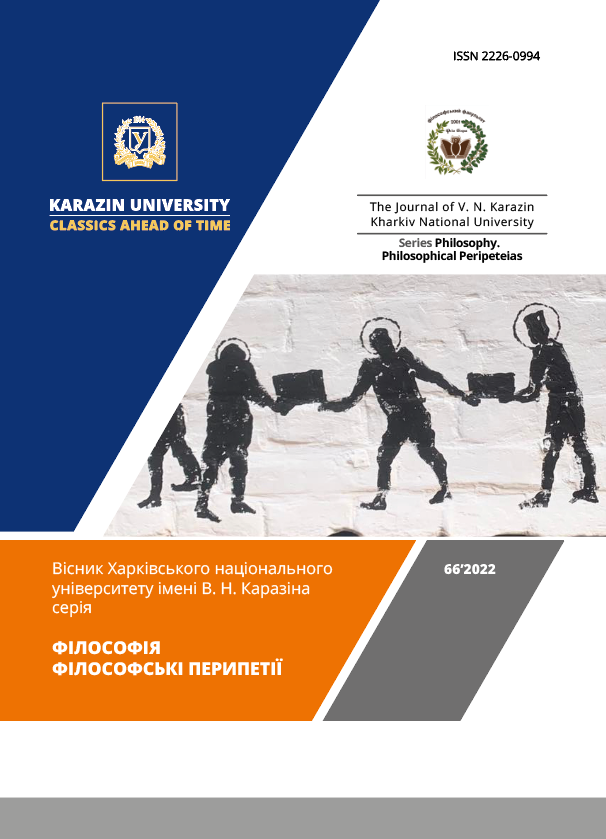ONTOLOGICAL SYSTEM OF BARDAISAN – FREE WILL AND “ETHICAL COSMOLOGY”
Abstract
The article is devoted to the reconstruction of the ontological system of Bardaisan. A specific view of ethics as an ontological construct is characteristic of the Middle Eastern philosophical tradition. The teachings of Bardaisan lie at the origins of the Syrian religious philosophy, therefore the reconstruction of his teachings allows us to understand the main sources that formed the Eastern philosophical tradition in its originality. A detailed philosophical analysis of the concept of fate in the teachings of Bardaisan has not previously been undertaken. In addition, most of the studies paid more attention to the history of borrowings and the origin of various concepts of the Bardaisanite philosophy and their doxography, while the analysis of individual concepts was usually left out of brackets. The study of Bardaisan as a philosopher from the point of view of the modern philosophical tradition is undertaken for the first time. The article pays great attention to the phenomenon of free will, the construct underlying Bardaisan's “ethical cosmology”. The transformation of Babylonian astrology and Jewish symbolism serves as a civilizational backdrop against which Bardaisan weaves Christian ethics, Zoroastrian ontology, and Stoic anthropology. Understanding the peculiarities of citing Greek philosophy, as well as building the main ontological constructs, provides the key to understanding the Middle Eastern philosophical tradition. The dialogue "Book of Laws and Countries", which is considered in the article, is a vivid example of a treatise-mesekhet, a multilevel discourse, the space of a language game, images and tropes. The article examines models of interaction of various discourses and various strategies for building a philosophical treatise. Plato's dialogue, using Middle Eastern metaphor, reveals the space of language play and intertextuality, dissemination.
Downloads
References
Averinczev, S. S. (1988). L'anima e lo specchio. L'universo della poetica bizantina. [The soul and the mirror. The universe of Byzantine poetics]. Bologna: Società editrice il Mulino. [In Italian].
Boyarin, D. (1994). Intertextuality and the Reading of Midrash. Bloomington & Indianapolis: Indiana University Press.
Cureton, W. (1855). Spicilegium Syriacum, containing remains of Bardesan, Meliton, Ambrose and Mara bar Serapion, ed. with an English transl. and notes, London.
Derrida, J. (1981). Dissemination. London: The Athlone press.
Drijwers, H.J.W. (2014). Bardaisan of Edessa. New Jersey: Gorgias press.
Handelman, S. (1983). Slayers of Moses: The Emergence of Rabbinic Interpretation in Modern Literary Theory. New York: SUNY Press.
Heidegger, M. (1996). Being and Time. New York: Albany.
Kovelman, A. (2005). Between Alexandria and Jerusalem: The Dynamic of Hellenistic and Jewish Culture. Leiden, Boston: Brill.
Merx, A. (1863). Bardesanes von Odessa, nebst einer Untersuchung über das Verhältnis der clementinishen Recognitionen zu dem Buche der Gesetze der Länder. Halle. [In German].
Nau, F. (1897). Une biographie inédite de Bardesane l’Astrologue. Paris. [In French].
Possekel, U. (2007). Bardaisan of Edessa: Philosopher or Theologian? Zeitschrift für Antikes Christentum 10(3), pp. 442-461.
Possekel, U. (2012). Bardaisan and Origen on Fate and the Power of the Stars. Journal of Early Christian Studies. vol 20, pp. 515-541.
Robertson, P. (2017). Greco-Roman Ethical-Philosophical Influences in Bardaisan’s “Book of the Laws of Countries”. Vigiliae christianae vol. 71, pp. 511-540.
Schaeder, H. (1932). ‘Bardesanes von Edessa in der Ueberlieferung der griechischen und syrischen Kirche’, Zeitschrift für die neutestamentliche Wissenschaft und die Kunde der älteren Kirche, LI, pp. 21–74. [In German].
Copyright (c) 2022 Микита Артеменко

This work is licensed under a Creative Commons Attribution 4.0 International License.
Authors who publish with this journal agree to the following terms:
- Authors retain copyright and grant the journal right of first publication of this work under the terms of a license Creative Commons Attribution License 4.0 International (CC BY 4.0).
- Authors are able to enter into separate, additional contractual arrangements for the non-exclusive distribution of the journal's published version of the work (e.g., post it to an institutional repository or publish it in a book), with an acknowledgement of its initial publication in this journal.
- Authors are permitted and encouraged to post their work online (e.g., in institutional repositories or on their website) prior to and during the submission process, as it can lead to productive exchanges, as well as earlier and greater citation of published work.






3.gif)




